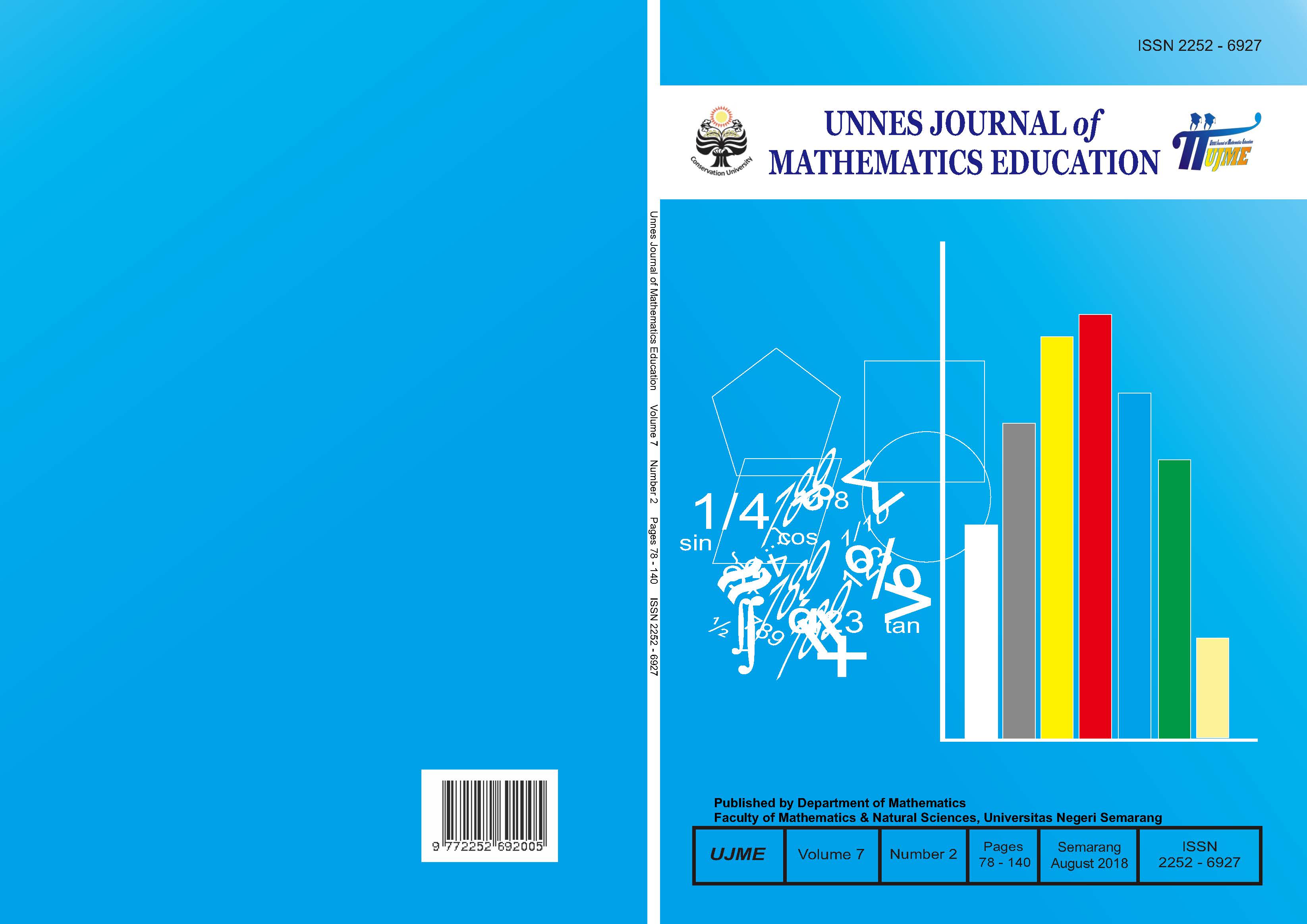Analysis of mathematical reasoning ability of junior high school students of grade VII viewed from cognitive style on problem based learning with mind mapping
##plugins.themes.academic_pro.article.main##
Abstract
The method used in this research is a mixed method with the research design that is explanatory sequential design. The result of this research are (1) Mathematical reasoning ability of grade VII students after being given learning by using PBL with mind mapping reached minimal completeness criteria; (2) the description of students' mathematical reasoning ability with independent field cognitive style were capable to present mathematical statements, propose conjecture, do mathematical manipulation, give reason to solution, and draw conclusion; and (3) the description of students' mathematical reasoning ability with field-dependent cognitive style were capable to present mathematical statements, yet incapable to propose conjecture, FDK students were less able to manipulate mathematics, while FDL students were incapable to perform mathematical manipulation, provide reason for solution, and draw conclusions.
##plugins.themes.academic_pro.article.details##
References
Agoestanto, A., Yuda, O., Priyanto, S., & Eko, B. (2018). The effectiveness of auditory intellectually repetition learning aided by questions box towards students ’ mathematical reasoning ability grade XI SMA 2 Pati. Unnes Journal of Mathematics Education, 7(1), 17–23. https://doi.org/10.15294/ujme.v7i1.15828
Alvani. (2016). Profil Kreativitas Siswa SMP dalam Menyelesaikan Soal tentang Bangun Ruang Sisi Datar Ditinjau dari Gaya Kognitif. Jurnal Matematika Kreatif-Inovatif, 7(2), 171–178.
Arends, R. I. (2013). Belajar untuk Mengajar (9th ed.). Jakarta: Salemba Humanika.
Buhaerah. (2011). Pembelajaran Berbasis Masalah untuk Meningkatkan Kemampuan Penalaran Matematis Siswa SMP. Gamatika, II(1), 52–61.
Creswell, J. W. (2014). Educational Research: Planning, Conducting and Evaluating Quantitative and Qualitative Research (Fourth). United States of America: PEARSON.
Haryanti, C. F., & Masriyah. (2018). Profil Penalaran Matematika Siswa SMP dalam Memecahkan Masalah Open Ended Ditinjau dari Gaya Kognitif Field Dependent dan Field Independent. Jurnal Ilmiah Pendidikan Matematika, 2(7), 197–204.
Kemdikbud. Permendikbud Nomor 58 Tahun 2014 (2014).
Kemdikbud. (2017). Konferensi Pers UN 2017 Jenjang SMP.
Marsa, K. A. B. S., Noer, S. H., & Sutiarso, S. (2014). Penerapan Pembelajaran Berbasis Masalah untuk Meningkatkan Kemampuan Penalaran Matematis dan Self Confidence. Jurnal Pendidikan Matematika Unila, 2(6).
Mikrayanti. (2016). Meningkatkan Kemampuan Penalaran Matematis melalui Pembelajaran Berbasis Masalah. Suska Journal of Mathematics Education, 2(2), 97–102.
Mulyanah, Hanurawati, N., & Coesamin, M. (2013). Pengaruh Model Pembelajaran Kooperatif Metode Mind Mapping Terhadap Pemahaman Konsep Matematis Siswa. Jurnal Pendidikan Matematika Unila, 1(4).
Nuriana, K., Pujiastuti, E., & Soedjoko, E. (2018). Kemampuan Berpikir Reflektif Matematis Siswa Kelas VII Ditinjau dari Gaya Kognitif pada Model Pembelajaran PBL. In PRISMA, PROSIDING SEMINAR NASIONAL MATEMATIKA (Vol. 1, pp. 177–188).
Rifqiyana, L. (2015). Analisis Kemampuan Berpikir Kritis Siswa Dengan Pembelajaran Model 4K Materi Geometri Kelas Viii Ditinjau Dari Gaya. Universitas Negeri Semarang.
Riyanto, B., & Siroj, R. A. (2011). Meningkatkan kemampuan penalaran dan prestasi matematika dengan pendekatan konstruktivisme pada siswa sekolah menengah atas. Jurnal Pendidikan Matematika, 5(Juli), 111–128.
Rosnawati, R. (2013). Kemampuan penalaran matematika siswa SMP Indonesia pada TIMSS 2011. In Prosiding Seminar Nasional Penelitian, Pendidikan dan Penerapan MIPA. Retrieved from http://staffnew.uny.ac.id/upload/132001808/penelitian/Makalah+Semnas+2013+an+R+Rosnawati+FMIPA+UNY.pdf
Ruslan, A. S., & Santoso, B. (2013). Pengaruh Pemberian Soal Open-Ended Terhadap Kemampuan Penalaran Matematis Siswa. Jurnal Kreano, 4(2), 138–150.
Saputro, D. A., Masrukan, & Agoestanto, A. (2017). Mathematical Communication Ability by Grade VII Students Using a Themed Problem Based Learning with Scaffolding on Rectangle Materials. Unnes Journal of Mathematics Education, 6(2), 239–248.
Silaban, R., & Napitulu, M. A. (2012). Pengaruh Media Mind Mapping Terhadap Kreativitas dan Hasil Belajar Kimia Siswa SMA pada Pembelajaran Menggunakan Advance Organizer.
Sulistiawati. (2014). Analisis Kesulitan Belajar Kemampuan Penalaran Matematis Siswa SMP pada Materi Luas Permukaan dan Volume Limas. In Proceeding Seminar Nasional Pendidikan Matematika, Sains, dan TIK STKIP Surya (pp. 205–225).
Triastuti, R., Asikin, M., & Wijayanti, K. (2013). Keefektifan Model CIRC Berbasis Joyful Learning Terhadap Kemampuan Penalaran Matematis Siswa SMP. Jurnal Kreano, 4(2), 182–188.
Usodo, B. (2011). Profil Intuisi Mahasiswa dalam Memecahkan Masalah Matematika Ditinjau dari Gaya Kognitif Field Dependent dan Field Independent. In Prosiding Seminar Nasional Matematika dan Pendidikan Matematika UNS (pp. 95–172).
Witkin, H. A., Moore, C. A., Goodenough, D., & Cox, P. W. (1977). Field-Dependent and Field-Independent Cognitive Styles and Their Educational Implications. Review of Educational Research, 47(1), 1–64. https://doi.org/10.3102/00346543047001001
Yekti, S. M. P., Kusmayadi, T. A., & Riyadi. (2016). Penalaran Matematis Siswa dalam Pemecahan Masalah Aljabar Ditinjau dari Gaya Kognitif Field Dependent - Field Independent. JMEE, 6(2), 178–192.
